Geoblog.pl  PawelK
PawelK  Podróże
Podróże  Pawel K-a podroz ciagle trwa... the journey is still on move ....
Pawel K-a podroz ciagle trwa... the journey is still on move ....  Sailing Africa mission SUCESS!!!(english only)
Sailing Africa mission SUCESS!!!(english only)
 PawelK
PawelK  Podróże
Podróże  Pawel K-a podroz ciagle trwa... the journey is still on move ....
Pawel K-a podroz ciagle trwa... the journey is still on move ....  Sailing Africa mission SUCESS!!!(english only)
Sailing Africa mission SUCESS!!!(english only) 
All is ready, I'm ready! Uncel Adventure is on a mision!
Time is good.
Place is good.
Budget is good.
Place to stay good.
Even some frendly people for a good begining.
Tomorrow I will start my mision, Sail Africa Mision!!
Every day can bring a good news!
A bid hot but what you can do with it?
Dunsborouh- Darwin in 9 days with stop over in Uluru and some more places on Stuard Hwy hichhiking. If this is possible, So whay not hichhike a bout to Africa hey?
We will see what will hapend!
AND AFTER 4 DAYS:
Hi everybody
I have just find a yacht in Darwin to South Africa and would like to share my info about this.
01.08.2010 I have come to Darwin to hitch a ride to Africa.
Realistically i started moving around on thursday and just 2 days later had a call and preposition to crew on 60ft. Yacht to South Africa.
The yacht name is Tamasha, is 30 miters long. Modern navigation equpment, watermaker and is Butifule!! My provison will be prowideded so it cost me nothing!
We will be going throu Kimberly, Broome, Cocos Island, Mauritius, Reunion to South Africa. Around 4 mounths.
Now you are probably thinking that it must be really easy If I have done it in just few days??
But it isn't!! I was really lucky
Every year there will be maybe a fraction of boats going in this direction.
But lets start from the beginning:
- Time and place:
The best time is July and August to be in Darwin and look for boats. You can also tray in Bali in August or Phuket in January but this is going through Sues Canal.
For Skippers ideal timing to cross Indian Ocean is live Darwin in half august and be in Cocos islands around 1 September and than cross. September is the calmest month on Indian Ocean.
There could be some boats going in Sail Indonesia Rally and cut out in Bali and than heading to Africa but there is not much, a specialty that many of them already has paid a lot to join Sail Indonesia Rally.
There is also ARC World Race witch comes to Darwin around 20 august and live to Bali and than the go to South Africa. But I haven't contact with them. There could be a small chance that there will be any body looking for crew.
- Work to be done in Darwin:
You will have to go to Darwin Yacht Club, Danach Beach Yacht Club, Spot On Marina, Cullan Bay Marina and Frances Bay Marina.
Put yours note on the wall and speak with as many sailors as you can, spreed the word. The sailing social net will work for you.
You will also met many experienced old sailors who will be happy to sheer their knowledge.
- Internet!!
You have to be knowledgeable about sailing, at list in theory.
You can find many, many info on website below:
www.noonside.com (Circumnavigation info)
www.cruserlog.com (many many info)
www.7knots.com
www.findacrew.com
www.worldcruisingclub.com
www.tripsailor.com (some blogs of South Africa boat)
But remember it is also good to tray sailing before and now what is going on. This skipper which is taking me. Sad "yes"
because I had experience!
You can tray some sailing in short races in DYC but there isn't much of them.
Yours neut have to be written almost like work application.
Treat it professionally and people will treat you seriously.
I have seen many nuts and it can't be just couple of sentences that you like sailing!!
About that I will just past hire a text from Lily Barlow! Thanks girl for that work. It is perfect!! www.couchsurfin.com /Boat hichhiking group.
And people whan you are planing to hitch a ride on a boat. First do yours homework!!! and than tray to do it. It is just easier.
You have to be ready to wait long and do not loose patience. It is not good for people with timetable!
Lily Barlow text.
Maybe there were always nomads out there taking to the seas. Maybe travelers just got sick of the highways. Or maybe the aviation industry finally spilled too much fuel... In any case, boat-hitching is gaining ground in the rambling world – we wanna sail!
I was spat into the whirlwind of ocean cruising on other people’s boats when in Greece about a year ago, and have since hitched lifts through the Mediterranean, across the Atlantic to the Caribbean and up into North America. Along the way I’ve picked up bits and pieces of information to help the boat-hitching traveler… so thought I’d set them down and spread the word!
• You can choose where you want to go, OR when you want to go… but rarely both. This is the most important thing to remember I think. Although there are a good amount of yachts sailing the oceans, they keep to pretty specific routes, and pretty specific seasons, so flexibility on the travellers behalf is huge. Find the boat first, THEN decide where you want to go or when you want to leave. This will save lots of disappointing dead ends and discouraging knockbacks.
• Be in the right place at the right time. This kind of follows the point above. Looking for a boat in Gibraltar in November, when all the yachties are sailing out of the Med. readying to cross the Atlantic, will be a lot smarter than rocking up there in June, when they will all be sipping Ouzo in Greece. Find out the cruising routes (link at the bottom of this page) and cruising seasons, so you know where to be to find the most boats going your way.
• So there are basically two ways to find a boat: Online, or in person. Most people do both. I am a huge advocate of the online method. Most skippers who need crew will put up something on one of the crew finding websites anyway… and a lot of the ‘cool’, ‘grassroots’ sailors won’t be hanging around marinas – they’ll be in a little (free) bay somewhere with a quiet anchorage. Browsing online will save you time, energy, and you’ll probably find a boat more suited to you, since you can check out their profile first. Check as many of the sites as you can, (I always use findacrew.net) and write to as many different boat owners as you can. Remember, be flexible. Just send send send, as many messages as you can. The system on findacrew.net is kind of shitty, where you can only send a pre-written message, but set up a good profile and make yourself sound like the adventurous spirited traveler that you are, and hopefully you’ll get some replies. If neither of you are premium members, you might have to pay the 50bucks for ten days or whatever. If you do, use that opportunity to write personal messages to any skipper who sounds interesting. Another option is to try to find them online, with the information they’ve given you in their profile, a lot of boat owners will have blogs. It’s still the biggest, and I think the best, website to use… but there are lots of others, check them out too.
• Weed out the dodgy ‘seeking relationship’ skippers. It’s not hard, just read their profile well, and check the signs. If they are looking for a ‘female’ between the ages of ’18 and 35’ for a ‘friendship/relationship’ you’ll probably get the idea. There are good people on these websites, you just got to find them! Also remember, it can take a lot of time for captains to plan journeys/crew, so the more time you have up your sleeve, the better. Start looking months before you want to head off. On the other hand, some will need crew right away, so be ready to go when they are!
• Then there’s the in person method. Go to marinas, poster every notice board you see. Be honest, write down your nationality, sex, age, level of experience, and include a photo. I’ve seen these around a lot, but honestly, I doubt their success rate. I think the best way to find a boat in person is to network network network. Hang out at the local bars (they’re sailors!), stay close by, hitchhike around, and try to meet as many people as you can. The word of mouth is huge in the yachty world, it’s all about someone who knows someone who knows someone. If you have time, get down to the cruising area just before the season begins, and stay a while (like a month or more!). Often they are great places to hangout anyway (British Virgin Islands, Majorca, Sicily…) and small communities, so you’ll be in with the crowd in no time. Be social!
• What experience do you need? Obviously, any time at sea, courses etc… is going to help, but don’t worry if you don’t have this. I started with nothing but a love of water. A lot of sailors will want to teach you THEIR way anyway, so having a clean slate might even help. Be prepared to offer whatever you have. Think of how your skills could be useful. Medical, cooking, and engineering, all very handy! Even a good musician can be a welcome addition to a crew. Be fit, be handy, be positive. Light hearted and fun, but sensible and with lots of common sense, that’s what most skippers will be looking for.
• It’s a good idea to know the basics. Read a book on the 101 of sailing. Which is port, which is starboard, how to tie a bowline… the very basics will help you a lot. Once you get ‘into’ the scene, you’ll be learning the jargon and systems in no time… just keep all eyes and ears open.
• The next step is seeing if the boat is right for you. Before any long passage, go for a ‘get-to-know-you’ sail, and spend up to a week with the skipper you’re signing on with. Finding crew is like finding friends, there’s a possibility you might just not get on. This will give you an idea of their lifestyle… do they drink a lot? (Ask about whether the boat is ‘dry’ at sea or not). Do they smoke? Boats are tiny spaces, if you’re a non-smoker, this might bother you. What kind of sail are you after? A nice big boat where you push a button and the sail goes up, another one and the sail goes down… or a little cruiser with no shower, no engine (ha, this is rare, but they WILL be cool!). In my opinion, the smaller it is, the better it is. Small boat owners will generally use their boat more, sail more instead of motor, and spend less time on the dock in a marina, and more time in pretty anchorages. A week long sail with them will tell you if they’re a motor sailor, or if they wait for weather windows and go where the wind blows.
• Ask about money. What is it going to cost you? The most common is that you pay for your food, and they pay the rest, but keep in mind this might be more than you would normally spend on food while on the road, so make sure you ask. Some skippers will ask you to pay a few boat costs too, mooring fees or fuel. You might be able to organize a ‘work exchange’ deal, if they need varnishing or maintenance done to the boat. Maybe they are getting hauled out, put on the hard for a week, and could really use a spare pair of hands. If you’re REALLY lucky, they will pay all the costs… and once you start getting some serious sea miles, you’ll even get PAID to go sailing!
• Finally, have a good think about if this is really for you. The idea of sailing off into the sunset might sound awesome, but try to imagine being at sea in rough weather, heeled over, raining and cold. Everything falling all over the place and never being still. Most watch schedules will mean 3-4 hours alone at night sailing the boat (after you have experience of course) and sleeping patterns are always erratic. You’ll be in a small space with several people (depending on the size of the boat, usually 3 or 4 crew on board) and not always in the best situations. You’ll need to keep your head together and be switched on almost 24hrs a day. Also, remember than more than HALF of your time on the boat will be spent anchored, moored, or docked somewhere. Usually this means working at putting the boat back together, installing new gadgets or waiting for the weather to change, and as crew you’re expected to help with this. It won’t all be high energy stuff.
On a brighter not e – it iS everything you imagined… dolphins, sunsets, sustainable transport and using your hands to carry you along… if you’re up for it, it’s magical.
HOPE YOU FIND THIS INFO HELP FULL IN THE FUTURE AND SEE YOU ON THE SEA.
FAIR WINDS!!!
Time is good.
Place is good.
Budget is good.
Place to stay good.
Even some frendly people for a good begining.
Tomorrow I will start my mision, Sail Africa Mision!!
Every day can bring a good news!
A bid hot but what you can do with it?
Dunsborouh- Darwin in 9 days with stop over in Uluru and some more places on Stuard Hwy hichhiking. If this is possible, So whay not hichhike a bout to Africa hey?
We will see what will hapend!
AND AFTER 4 DAYS:
Hi everybody
I have just find a yacht in Darwin to South Africa and would like to share my info about this.
01.08.2010 I have come to Darwin to hitch a ride to Africa.
Realistically i started moving around on thursday and just 2 days later had a call and preposition to crew on 60ft. Yacht to South Africa.
The yacht name is Tamasha, is 30 miters long. Modern navigation equpment, watermaker and is Butifule!! My provison will be prowideded so it cost me nothing!
We will be going throu Kimberly, Broome, Cocos Island, Mauritius, Reunion to South Africa. Around 4 mounths.
Now you are probably thinking that it must be really easy If I have done it in just few days??
But it isn't!! I was really lucky
Every year there will be maybe a fraction of boats going in this direction.
But lets start from the beginning:
- Time and place:
The best time is July and August to be in Darwin and look for boats. You can also tray in Bali in August or Phuket in January but this is going through Sues Canal.
For Skippers ideal timing to cross Indian Ocean is live Darwin in half august and be in Cocos islands around 1 September and than cross. September is the calmest month on Indian Ocean.
There could be some boats going in Sail Indonesia Rally and cut out in Bali and than heading to Africa but there is not much, a specialty that many of them already has paid a lot to join Sail Indonesia Rally.
There is also ARC World Race witch comes to Darwin around 20 august and live to Bali and than the go to South Africa. But I haven't contact with them. There could be a small chance that there will be any body looking for crew.
- Work to be done in Darwin:
You will have to go to Darwin Yacht Club, Danach Beach Yacht Club, Spot On Marina, Cullan Bay Marina and Frances Bay Marina.
Put yours note on the wall and speak with as many sailors as you can, spreed the word. The sailing social net will work for you.
You will also met many experienced old sailors who will be happy to sheer their knowledge.
- Internet!!
You have to be knowledgeable about sailing, at list in theory.
You can find many, many info on website below:
www.noonside.com (Circumnavigation info)
www.cruserlog.com (many many info)
www.7knots.com
www.findacrew.com
www.worldcruisingclub.com
www.tripsailor.com (some blogs of South Africa boat)
But remember it is also good to tray sailing before and now what is going on. This skipper which is taking me. Sad "yes"
because I had experience!
You can tray some sailing in short races in DYC but there isn't much of them.
Yours neut have to be written almost like work application.
Treat it professionally and people will treat you seriously.
I have seen many nuts and it can't be just couple of sentences that you like sailing!!
About that I will just past hire a text from Lily Barlow! Thanks girl for that work. It is perfect!! www.couchsurfin.com /Boat hichhiking group.
And people whan you are planing to hitch a ride on a boat. First do yours homework!!! and than tray to do it. It is just easier.
You have to be ready to wait long and do not loose patience. It is not good for people with timetable!
Lily Barlow text.
Maybe there were always nomads out there taking to the seas. Maybe travelers just got sick of the highways. Or maybe the aviation industry finally spilled too much fuel... In any case, boat-hitching is gaining ground in the rambling world – we wanna sail!
I was spat into the whirlwind of ocean cruising on other people’s boats when in Greece about a year ago, and have since hitched lifts through the Mediterranean, across the Atlantic to the Caribbean and up into North America. Along the way I’ve picked up bits and pieces of information to help the boat-hitching traveler… so thought I’d set them down and spread the word!
• You can choose where you want to go, OR when you want to go… but rarely both. This is the most important thing to remember I think. Although there are a good amount of yachts sailing the oceans, they keep to pretty specific routes, and pretty specific seasons, so flexibility on the travellers behalf is huge. Find the boat first, THEN decide where you want to go or when you want to leave. This will save lots of disappointing dead ends and discouraging knockbacks.
• Be in the right place at the right time. This kind of follows the point above. Looking for a boat in Gibraltar in November, when all the yachties are sailing out of the Med. readying to cross the Atlantic, will be a lot smarter than rocking up there in June, when they will all be sipping Ouzo in Greece. Find out the cruising routes (link at the bottom of this page) and cruising seasons, so you know where to be to find the most boats going your way.
• So there are basically two ways to find a boat: Online, or in person. Most people do both. I am a huge advocate of the online method. Most skippers who need crew will put up something on one of the crew finding websites anyway… and a lot of the ‘cool’, ‘grassroots’ sailors won’t be hanging around marinas – they’ll be in a little (free) bay somewhere with a quiet anchorage. Browsing online will save you time, energy, and you’ll probably find a boat more suited to you, since you can check out their profile first. Check as many of the sites as you can, (I always use findacrew.net) and write to as many different boat owners as you can. Remember, be flexible. Just send send send, as many messages as you can. The system on findacrew.net is kind of shitty, where you can only send a pre-written message, but set up a good profile and make yourself sound like the adventurous spirited traveler that you are, and hopefully you’ll get some replies. If neither of you are premium members, you might have to pay the 50bucks for ten days or whatever. If you do, use that opportunity to write personal messages to any skipper who sounds interesting. Another option is to try to find them online, with the information they’ve given you in their profile, a lot of boat owners will have blogs. It’s still the biggest, and I think the best, website to use… but there are lots of others, check them out too.
• Weed out the dodgy ‘seeking relationship’ skippers. It’s not hard, just read their profile well, and check the signs. If they are looking for a ‘female’ between the ages of ’18 and 35’ for a ‘friendship/relationship’ you’ll probably get the idea. There are good people on these websites, you just got to find them! Also remember, it can take a lot of time for captains to plan journeys/crew, so the more time you have up your sleeve, the better. Start looking months before you want to head off. On the other hand, some will need crew right away, so be ready to go when they are!
• Then there’s the in person method. Go to marinas, poster every notice board you see. Be honest, write down your nationality, sex, age, level of experience, and include a photo. I’ve seen these around a lot, but honestly, I doubt their success rate. I think the best way to find a boat in person is to network network network. Hang out at the local bars (they’re sailors!), stay close by, hitchhike around, and try to meet as many people as you can. The word of mouth is huge in the yachty world, it’s all about someone who knows someone who knows someone. If you have time, get down to the cruising area just before the season begins, and stay a while (like a month or more!). Often they are great places to hangout anyway (British Virgin Islands, Majorca, Sicily…) and small communities, so you’ll be in with the crowd in no time. Be social!
• What experience do you need? Obviously, any time at sea, courses etc… is going to help, but don’t worry if you don’t have this. I started with nothing but a love of water. A lot of sailors will want to teach you THEIR way anyway, so having a clean slate might even help. Be prepared to offer whatever you have. Think of how your skills could be useful. Medical, cooking, and engineering, all very handy! Even a good musician can be a welcome addition to a crew. Be fit, be handy, be positive. Light hearted and fun, but sensible and with lots of common sense, that’s what most skippers will be looking for.
• It’s a good idea to know the basics. Read a book on the 101 of sailing. Which is port, which is starboard, how to tie a bowline… the very basics will help you a lot. Once you get ‘into’ the scene, you’ll be learning the jargon and systems in no time… just keep all eyes and ears open.
• The next step is seeing if the boat is right for you. Before any long passage, go for a ‘get-to-know-you’ sail, and spend up to a week with the skipper you’re signing on with. Finding crew is like finding friends, there’s a possibility you might just not get on. This will give you an idea of their lifestyle… do they drink a lot? (Ask about whether the boat is ‘dry’ at sea or not). Do they smoke? Boats are tiny spaces, if you’re a non-smoker, this might bother you. What kind of sail are you after? A nice big boat where you push a button and the sail goes up, another one and the sail goes down… or a little cruiser with no shower, no engine (ha, this is rare, but they WILL be cool!). In my opinion, the smaller it is, the better it is. Small boat owners will generally use their boat more, sail more instead of motor, and spend less time on the dock in a marina, and more time in pretty anchorages. A week long sail with them will tell you if they’re a motor sailor, or if they wait for weather windows and go where the wind blows.
• Ask about money. What is it going to cost you? The most common is that you pay for your food, and they pay the rest, but keep in mind this might be more than you would normally spend on food while on the road, so make sure you ask. Some skippers will ask you to pay a few boat costs too, mooring fees or fuel. You might be able to organize a ‘work exchange’ deal, if they need varnishing or maintenance done to the boat. Maybe they are getting hauled out, put on the hard for a week, and could really use a spare pair of hands. If you’re REALLY lucky, they will pay all the costs… and once you start getting some serious sea miles, you’ll even get PAID to go sailing!
• Finally, have a good think about if this is really for you. The idea of sailing off into the sunset might sound awesome, but try to imagine being at sea in rough weather, heeled over, raining and cold. Everything falling all over the place and never being still. Most watch schedules will mean 3-4 hours alone at night sailing the boat (after you have experience of course) and sleeping patterns are always erratic. You’ll be in a small space with several people (depending on the size of the boat, usually 3 or 4 crew on board) and not always in the best situations. You’ll need to keep your head together and be switched on almost 24hrs a day. Also, remember than more than HALF of your time on the boat will be spent anchored, moored, or docked somewhere. Usually this means working at putting the boat back together, installing new gadgets or waiting for the weather to change, and as crew you’re expected to help with this. It won’t all be high energy stuff.
On a brighter not e – it iS everything you imagined… dolphins, sunsets, sustainable transport and using your hands to carry you along… if you’re up for it, it’s magical.
HOPE YOU FIND THIS INFO HELP FULL IN THE FUTURE AND SEE YOU ON THE SEA.
FAIR WINDS!!!
Komentarze (3)

 awe - 2010-07-31 20:11
awe - 2010-07-31 20:11haha. w koncu sie zaczyna...
 madzia-bka - 2010-08-11 21:59
madzia-bka - 2010-08-11 21:59Dlaczego tylko po angielsku wpis? Paweł - pamiętaj o Zambii!!! Trzymamy kciuki :)
 maKaska - 2010-08-12 17:30
maKaska - 2010-08-12 17:30No jasne...., znow po angielsku....... hm..... , a my polsko-jezyczne wielbicielki ?
Przeciez " NAJWIECEJ WITAMINY maja POLSKIE DZIEWCZYNY " !
Pamietaj nie tylko o Zambii !
Cmok !
Przeciez " NAJWIECEJ WITAMINY maja POLSKIE DZIEWCZYNY " !
Pamietaj nie tylko o Zambii !
Cmok !






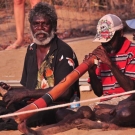
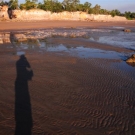
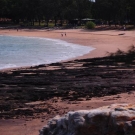


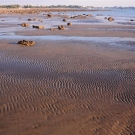
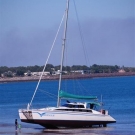
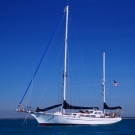
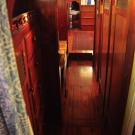
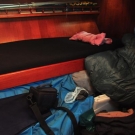
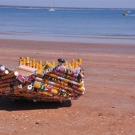
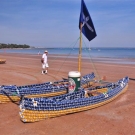

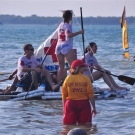

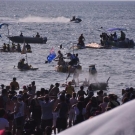
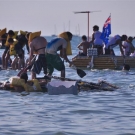
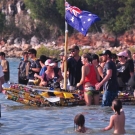
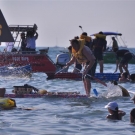
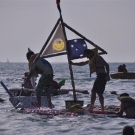
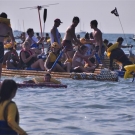
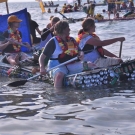
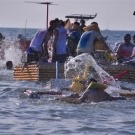
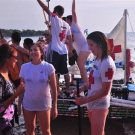
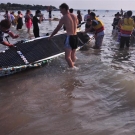
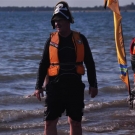




 Zasoby:
Zasoby: 




